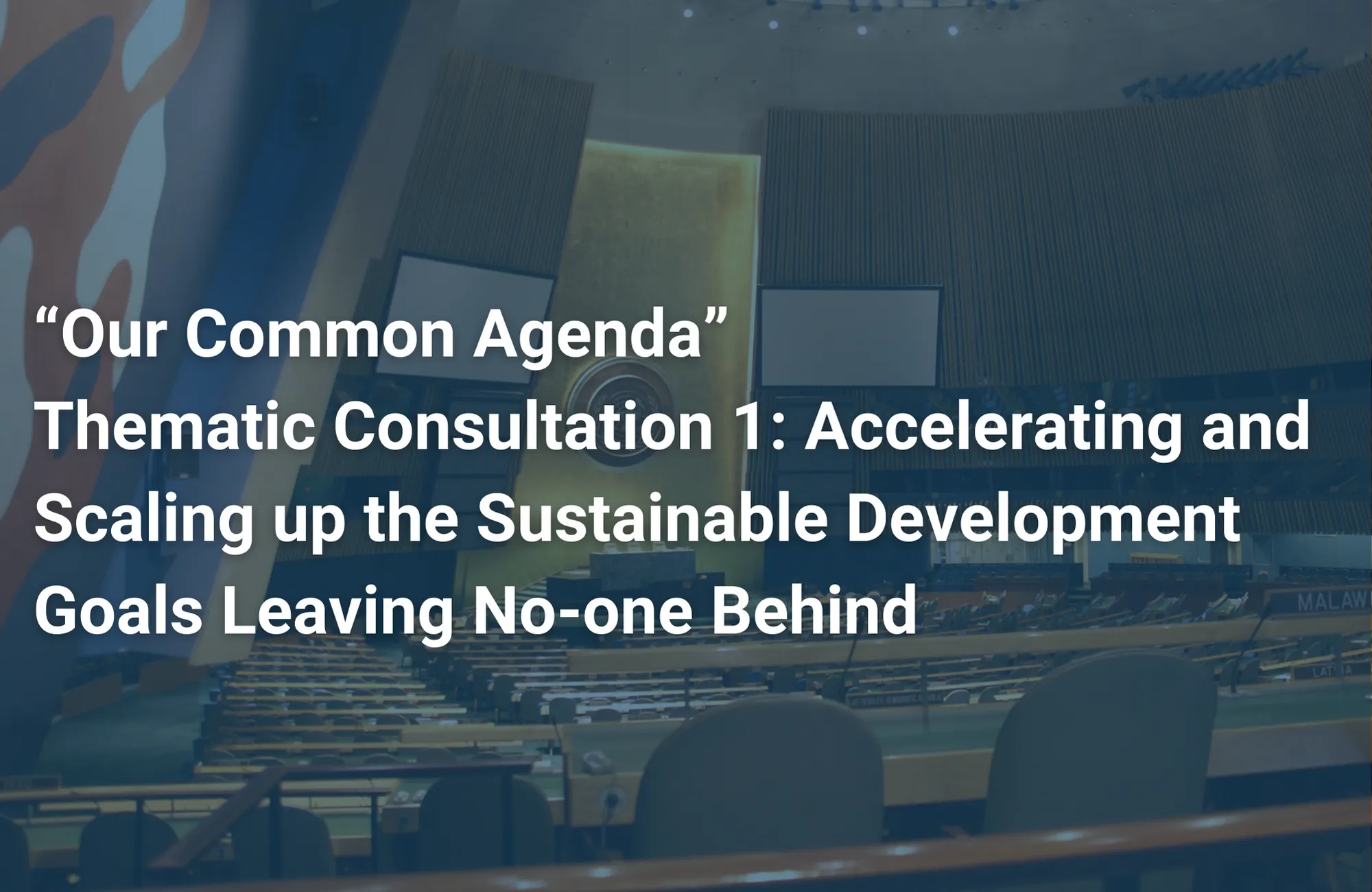“Our Common Agenda”, Thematic Consultation 1

“Our Common Agenda”
Thematic Consultation 1
Accelerating and Scaling up the Sustainable Development Goals Leaving No-one Behind
10-11 February 2022
UN Headquarters, New York
Statement by Massimo Tommasoli
Permanent Observer and Director of Global Programmes
International Institute for Democracy and Electoral Assistance
Excellencies,
In its effort to advance and strengthen democracy worldwide, International IDEA affirms that "inclusive and accountable democratic institutions and processes are only possible if gender equality and inclusion of marginalised groups in democratic processes and institutions is attained”. According to the 2021 Global State of Democracy (GSoD) Report that we launched in last November, out of the three GSoD-based regime classifications— democracies, hybrid regimes and non-democracies — the data shows that democracies provide better guarantees for gender equality. Our analysis highlights that one of the major challenges to democracy is that “in the past four decades, the slowest gains have been made in gender equality, social group equality in access to political power”.
Furthermore, the inclusion of a stand-alone goal to “achieve gender equality and empower all women and girls” SDG 5 in the 2030 Agenda for Sustainable Development attests to the evident global consensus that gender equality is a constituent ingredient for sustainable development and any well-functioning, participatory and representative democracy. Efforts at accelerating and scaling up the SDGs in this respect should be based on challenging gender stereotypes; ending gender-based violence, including political violence against women; and achieving gender balance in decision making and politics.
Democracy processes and institutions remain partial and flawed if they don’t address the causes of exclusion or marginalisation of different segments of the populations both as actors and beneficiaries of democratic development.
Hence, International IDEA’s work on gender equality and political empowerment is premised in the principle that every person, regardless of age, gender, sexual orientation, disability, race, ethnicity, religious beliefs or other status should have an equal right and opportunity to participate, be represented and contribute to the functioning of democratic processes and institutions-such as electoral processes, constitution building, political participation and representation (political parties, parliaments), shaping the global state of democracy and broadly citizens’ engagement in the public sphere.
In many parts of the world, gender inequalities remain deeply entrenched and societies are characterised by processes and systems marked by discriminatory practices and marginalisation.
Global evidence shows that equal rights that exist in law can be denied in practice as these rights are not always translated into reality. For instance, in several countries, women’s ability to stand for elective positions of power and decision making is restricted by political violence and conflict as well as cultural barriers, which are sceptical about women’s decision-making capacity and are unsupportive of women’s participation and leadership.
Achieving gender equality and women’s political empowerment is a slow process since it challenges one of the most deeply entrenched social practices and systems that assign people fixed roles in the family and in society on the basis of sex and perceptions of gender. The gap between women and men on political empowerment remains wide and is evident in the predominance of men in leadership and decision-making positions such as executive or cabinet ministers, parliamentarians or senators, judiciary, heads of Electoral Management Bodies, municipal or council authorities, heads of State and Government, private sector executives and executives of regional or international organisations. The Global Gender Gap report highlights that the gender gap in political empowerment remains the largest.
At the current rate of progress, it is estimated that it will take 145.5 years to attain gender parity in politics. In 81 countries, there has never been a woman head of state, as of January 2021.
Excellencies,
The pandemic has been particularly harsh on the most vulnerable, fragile and excluded people in our societies. Inequality has exacerbated its impact with long-standing consequences that have completely changed the perspectives of achieving the SDGs by 2030. As indicated in the 2021 IDEA’s Global State of Democracy Report,3 for the international community to decisively act on the 2030 Agenda for Sustainable Development, both State and non-State actors should forge an alliance to address inequality upfront by means of such measures as:
- National and local governments and political parties should redesign democratic institutions with the needs of historically disadvantaged and marginalized groups at the forefront. Governments, with support from civil society, must urgently set concrete, timebound targets to reduce inequalities, invest in universal public services, and adopt progressive taxation of the wealthiest members of society.
- Donors should also consider making action on inequality a condition of funding, going beyond superficial markers of diversity into more substantive evidence that inequalities are addressed in systematic ways.
- Academia has a key role to play in evaluating innovative practices in this field, in terms of both process and outcomes, and should continuously feed practitioners with lessons on how democratic practices and tools can make democracy more inclusive.
- Political parties should prioritize gender equality and broad inclusion, facilitating women’s and other disadvantaged groups’ participation and representation to ensure more responsive policies. Civil society and media have a key role to play in monitoring progress, suggesting reforms and facilitating debate around progress on equality.
- Political parties and legislatures should design creative ways to include youth in political decision-making processes. Good examples include lowering the voting age, establishing a youth ombudsman and/or including youth representatives in democratic decisionmaking bodies.
- Governments should consider defining fiscal contracts with citizens by convening, for example, national dialogues over a fiscal pact committed to improving equity in tax enforcement and taxpayer services, broadening direct taxation, and strengthening civil society engagement with tax issues.
International IDEA stands ready to continue to collaborate with the United Nations and all interested partners in order to pursue such an ambitious agenda.
I thank you.
